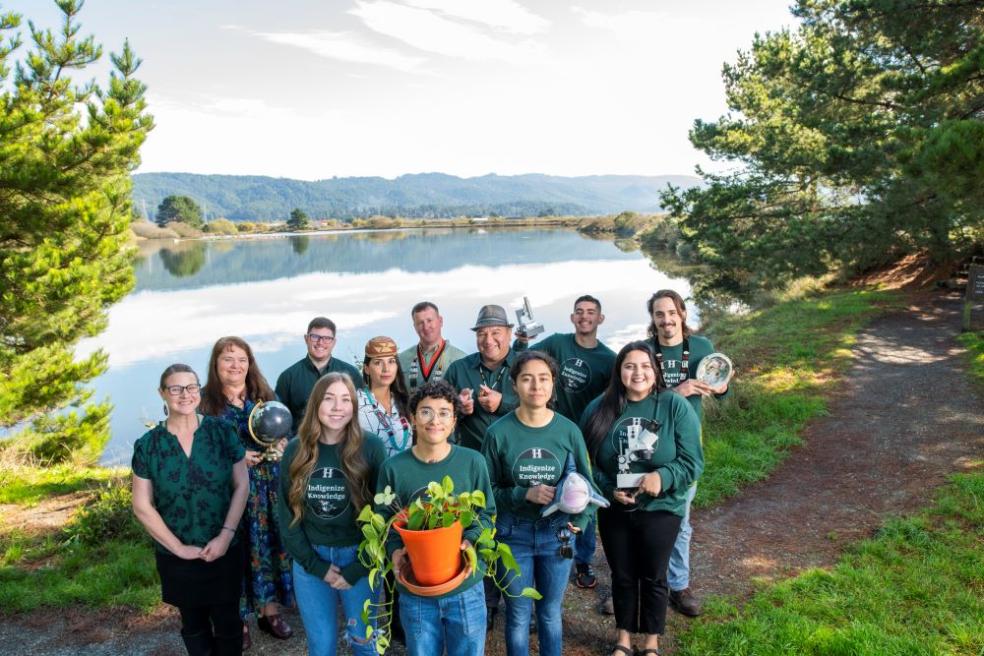
INRSEP began as the Native American Career Education in Natural Resources program in 1974, eventually evolving into INRSEP, providing Native students academic and research support. Today, INRSEP retains its foundational identity and has expanded support for all historically underrepresented students across science and engineering fields with a strong focus on American Indian and Indigenous students. As one of eight programs under COMPASS, INRSEP’s core values of “braiding science, culture, and community” emphasize inclusivity and a holistic approach, ensuring that no student is left behind in the pursuit of higher education and professional development.
“We embrace the adage to lift as you climb and instill in current students their responsibility to pay it back once they are professionals by returning to the source (INRSEP) to provide opportunities and resources to future INRSEP students,” says INRSEP Native Programs coordinator Lonyx Landry, an INRSEP academic advisor for 12 years.
Higher education is certainly filled with an array of challenges, especially for first-generation and marginalized students. To address these challenges INRSEP has made a commitment to offer academic advising, information on research opportunities, professional development programs, and assistance with graduate school applications.
INRSEP fosters students’ growth and helps them thrive by preparing them to be competitive candidates for internships, fellowships, and graduate program assistantships in STEMM fields. The program encourages and facilitates attendance at national conferences, supports participation in rigorous research experiences for undergraduates with the National Science Foundation, and assists upcoming graduates in securing career-related jobs or post-baccalaureate studies.Over the years, INRSEP has transformed countless lives, including that of Oceanography major Ashton Perfecto.
“INRSEP has made me feel incredibly cared for in my times of fear and uncertainty while I've been here in Humboldt, and it has gifted me a caring network I can lean on. I hope that in the next 50 years, INRSEP continues sowing seeds of success in the minds of their students,” Perfecto says.
Mathew Alexander Aparicio, a senior studying Biology, says that thanks to the support of INRSEP, he was selected for the McNair Scholars Program. As a McNair Scholar, he is gaining valuable research experience as an undergraduate, ranging from elephant seal population monitoring to jalapeño aquaculture. Aparicio and Perfecto’s experiences reflect INRSEP’s power to see the potential of students and help them achieve personal and academic goals.
As INRSEP continues to evolve, its commitment to braid Traditional Ecological Knowledge, AKA, Indigenous Knowledge (IK) with cutting-edge technology and working with local Native communities has become a hallmark of its approach to education and research. Working in collaboration with the Indian Tribal & Educational Personnel Program, INRSEP has hosted presentations, webinars, and invited guest speakers, ensuring that Indigenous perspectives and knowledge systems are central to the program’s methodology. This fusion of IK and mainstream sciences offers students a unique, culturally grounded approach to learning.
“I would not have been able to complete my undergrad without INRSEP. With INRSEP, I gained a family, support, and also a way to maintain my sanity during a very challenging choice of study,” says Corey Gray (‘97, Physics & Applied Mathematics), a member of the Siksika Nation (Northern Blackfoot) whose Blackfoot name is maguyuʔsuguu (makoyoohksokoyi or Wolf's Path). Gray is a senior gravitational wave detector operations specialist for the Laser Interferometer Gravitational-Wave Observatory (LIGO) in Washington, where he’s worked since 1998. He was part of a team that directly detected gravitational waves from the collision of two black holes 1.3 billion light years away. The discovery, which supports Albert Einstein’s General Theory of Relativity, won the Nobel Prize in Physics in 2017.
INRSEP will continue to inspire and empower future generations of STEM professionals. Learn more about INRSEP.